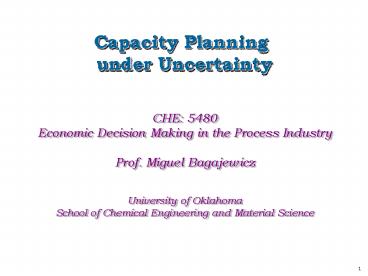Capacity Planning PowerPoint PPT Presentation
Title: Capacity Planning
1
Capacity Planning under Uncertainty
CHE 5480 Economic Decision Making in the Process
Industry Prof. Miguel Bagajewicz University of
Oklahoma School of Chemical Engineering and
Material Science
2
Characteristics of Two-Stage Stochastic
Optimization Models
- Philosophy
- Maximize the Expected Value of the objective
over all possible realizations of - uncertain parameters.
- Typically, the objective is Profit or Net
Present Value. - Sometimes the minimization of Cost is considered
as objective.
- Uncertainty
- Typically, the uncertain parameters are market
demands, availabilities, - prices, process yields, rate of interest,
inflation, etc. - In Two-Stage Programming, uncertainty is modeled
through a finite number - of independent Scenarios.
- Scenarios are typically formed by random samples
taken from the probability - distributions of the uncertain parameters.
3
Characteristics of Two-Stage Stochastic
Optimization Models
- First-Stage Decisions
- Taken before the uncertainty is revealed. They
usually correspond to structural - decisions (not operational).
- Also called Here and Now decisions.
- Represented by Design Variables.
- Examples
- To build a plant or not. How much capacity
should be added, etc. - To place an order now.
- To sign contracts or buy options.
- To pick a reactor volume, to pick a certain
number of trays and size - the condenser and the reboiler of a column,
etc
4
Characteristics of Two-Stage Stochastic
Optimization Models
- Second-Stage Decisions
- Taken in order to adapt the plan or design to
the uncertain parameters - realization.
- Also called Recourse decisions.
- Represented by Control Variables.
- Example the operating level the production
slate of a plant. - Sometimes first stage decisions can be treated
as second stage decisions. - In such case the problem is called a multiple
stage problem.
5
Two-Stage Stochastic Formulation
Let us leave it linear because as is it is
complex enough.!!!
Complete recourse the recourse cost (or profit)
for every possible uncertainty realization
remains finite, independently of the first-stage
decisions (x). Relatively complete recourse
the recourse cost (or profit) is feasible for
the set of feasible first-stage decisions. This
condition means that for every feasible
first-stage decision, there is a way of adapting
the plan to the realization of uncertain
parameters. We also have found that one can
sacrifice efficiency for certain scenarios to
improve risk management. We do not know how to
call this yet.
Technology matrix
Second Stage Variables
First stage variables
Recourse matrix (Fixed Recourse) Sometimes not
fixed (Interest rates in Portfolio Optimization)
6
Process Planning Under Uncertainty
7
Process Planning Under Uncertainty
8
MODEL
LIMITS ON EXPANSION
TOTAL CAPACITY IN EACH PERIOD
LIMIT ON THE NUMBER OF EXPANSIONS
LIMIT ON THE CAPITAL INVESTMENT
Yit An expansion of process I in period t takes
place (Yit1), does not take place (Yit0) Eit
Expansion of capacity of process i in period t.
Qit Capacity of process i in period t.
NEXPt maximum number of expansions in period t
ait Variable cost of expansion for process i
in period t ßit Fixed cost of expansion for
process i in period t Lower and
upper bounds on a process expansion in period t
I Processes i,1,,NP J Raw mat./Products,
j1,,NC T Time periods. T1,,NT L Markets,
l1,..NM
9
MODEL
UTILIZED CAPACITY IS LOWER THAN TOTAL CAPACITY
MATERIAL BALANCE
BOUNDS
INTEGER VARIABLES
NONNEGATIVITY
Yit An expansion of process I in period t takes
place (Yit1), does not take place (Yit0) Eit
Expansion of capacity of process i in period t.
Qit Capacity of process i in period t. Wit
Utilized capacity of process i in period t. Pjlt
Amount of raw material/intermediate product j
consumed from market l in period t Sjlt Amount
of intermediate product/product j sold in market
l in period t
I Processes i,1,,NP J Raw mat./Products,
j1,,NC T Time periods. T1,,NT L Markets,
l1,..NM
Lower and upper bounds on availability of raw
material j in market l in period t, scenario s
Lower and upper bounds on demand of product j in
market l in period t, scenario s
10
MODEL
OBJECTIVE FUNCTION
DISCOUNTED REVENUES
INVESTMENT
Yit An expansion of process I in period t takes
place (Yit1), does not take place (Yit0) Eit
Expansion of capacity of process i in period t.
Wit Utilized capacity of process i in period t.
Pjlt Amount of raw material/interm. product j
consumed from market l in period t Sjlt Amount
of intermediate product/product j sold in market
l in period t
?jlt Sale price of product/intermediate
product j in market l in period t Gjlt Cost of
product/intermediate product j in market l in
period t dit Operating cost of process i in
period t ait Variable cost of expansion for
process i in period t ßit Fixed cost of
expansion for process i in period t Lt
Discount factor for period t
I Processes i,1,,NP J Raw mat./Products,
j1,,NC T Time periods. T1,,NT L Markets,
l1,..NM
11
Example
- Uncertain Parameters Demands, Availabilities,
Sales Price, Purchase Price - Total of 400 Scenarios
- Project Staged in 3 Time Periods of 2, 2.5, 3.5
years
12
Example Solution with Max ENPV
Period 1 2 years
Period 2 2.5 years
Period 3 3.5 years
13
Example Solution with Min DRisk(?900)
Period 1 2 years
Period 2 2.5 years
Period 3 3.5 years
14
Example Solution with Max ENPV

